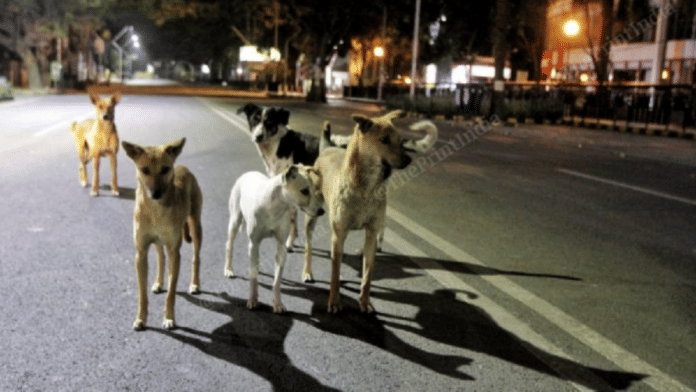Thank you dear subscribers, we are overwhelmed with your response.
Your Turn is a unique section from ThePrint featuring points of view from its subscribers. If you are a subscriber, have a point of view, please send it to us. If not, do subscribe here: https://englishdev.theprint.in/subscribe/
The few conscientious humans who care for them are ridiculed by most .
Dogs were domesticated by early humans as hunting companion and guards. Then some humans abandoned some of them who became stray dogs who got dirty were attacked by fleas and ticks, their hair fell out, making them susceptible to cuts, scrapes, infections, sores and scabs. They became marginalised .
Many government and non-government bodies have been working for them for a long time but there is hardly any change in the attitude of most humans towards colony dogs or improvement in man-stray dog relationships.
In Delhi stray dogs are managed by the State Government through its animal hospitals, dispensaries & programs and Central Government through Animal Welfare Board of India’s programs, schemes and grants. Unfortunately stray dogs still have not become community dogs.
That must change both for the welfare of humans and dogs and the only option left is to start 7 step decentralised management of colony dogs. This is an innovative, replicable, practical, low cost community-based and replicable program.
Its seven steps are:
- Contact Vatavaran Team (Vatavaran.organisation@gmail.com)
- Form a committee of the Nodal Residents who feed and/or care for the strays dogs.
3. Hire a Care Giving Team (details given below).
4. Have a Joint meeting of Vatavaran Team ,Nodal Residents, Dog Expert and representative of the Care Giving Team.
- Training Program for Care Giving Team (details given below).
6. Contacting the government personnel and forming a rapport with them.
7. launching the program by providing pre-decided uniforms for Care Giving Team, certificates of collaboration to nodal residents and a presentation by some dog expert covering the importance of communities in dog management.
Care Giving Team:
- Hired Care Giving Team will have males and females friendly towards dogs and who can write and read hindi.
- They will create a records of dogs of the colony where the program has to be started, Identify and mark feeding spots, prepare the feed and feed two times a day and keeping the feeding area clean.
- Give first aid, take dogs to a pre decided veterinarian if needed, get 9-18 months old male & female dogs sterilized
- Get, all adult &young dogs vaccinated for Rabies, Distemper, Hepatitis,
- Give First Aid Treatment and take the animal/s to the veterinary doctor as and when needed.
- Organize adoption functions, make eco-friendly dog collars, , dog houses , poop scoopers etc, both for the community dogs and pet dogs.
- Arrange meetings with pet dog owners to make them understand community dogs . Organize events to create awareness about all issues related to stray dogs.
- Set a counter to sell colony and pet dog related products created or procured.
Training Program
- During the training program The Care Giving Team would learn both theoretically and practically the dos and don’ts of living with strays,
- Trust instilling exercises like speaking in low tone and spending long hours would be undertaken.
- The right foods that are neither salty or sweet like Marie Biscuits, chapatties, dal, rice etc, right methods of feeding in multiple smaller heaps, right amount of food and
- importance of serving milk and fresh water in terracotta bowls would taught .
- The team would be trained in giving first aid, transporting colony dogs to veterinarians and comforting dogs during any treatment or procedure .
- Training would also cover innovating eco-friendly collars, coats and dog houses.
- The team will also get training in walking pets and grooming pets.
Two good examples:
Mraz loved stray dogs and was a care giver since his childhood. When he grew up he started his business of creating and selling dog beds. Mraz donates one waterproof bed to street dogs for every five beds sold to a local animal shelter.
Of the many blocks of Vasant Vihar only one has been able to control the garden rat infestations. The street dogs of that block have free entry to the back lanes of the block . Colony dogs are also fed in the back lanes. Their colony dogs have hunted down all the rats making that block rat free.
Last words
Instead of buying a dog adopt a dog. Call dogs of your area community dog instead of stray or street dogs. Let’s remember that the male pets very often impregnate the stray females. Remember training puppies is much easier than adults. identify community dogs according to their most conspicuous features. If they look like Al sessions, Labradors, Retrievers, Dobermans , German Shepard’s , Grey Hounds, Beagles train them as guard dogs. A typical Desi dog would makes a good companion dog.
These pieces are being published as they have been received – they have not been edited/fact-checked by ThePrint


